Holidays can bring some pleasant surprises. Far from the chaos of routine and the almost endless flow of information on social media, I found some time to enjoy some games that were stored in my console's library during the year.
Among them, I found the Final Fantasy Pixel Remaster collection, released for PlayStation 4, PlayStation 5 and Nintendo Switch on April 19, 2023, and on July 28, 2021 for Steam, Android and iOS. Its acquisition in the middle of the year ended with its first launch postponed until the end of this same year, and with it, the discovery of the best method I've ever seen to enjoy the first games of the franchise!
Ad
The most recent version available of the classics has several customizable features, such as the option between original or orchestrated soundtrack, resource and experience gain adjustments and the abundance of available languages, which amplify the product's quality of life and make it the definitive way to experience the classics in modern times.
What is Final Fantasy Pixel Remaster?
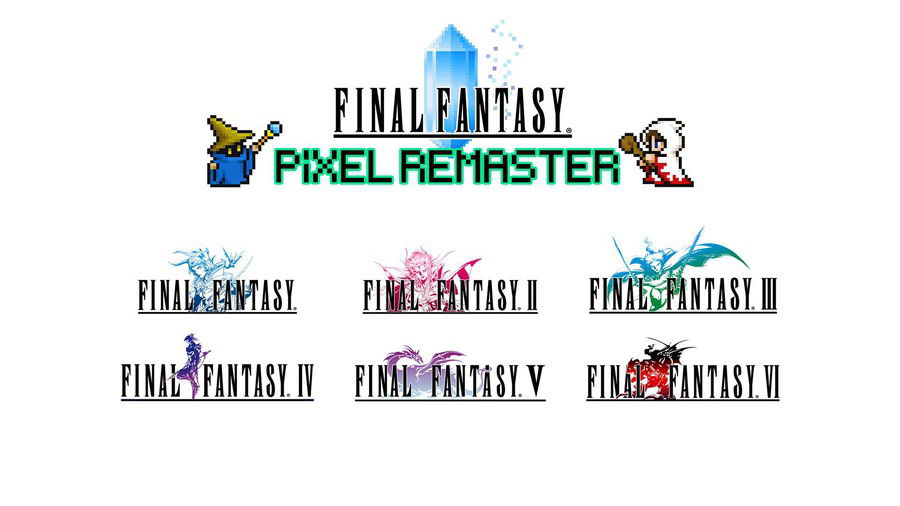
Final Fantasy Pixel Remaster is a collection of the first six titles in the Final Fantasy franchise, originally released between 1987 and 1994. Unlike other re-releases, this version seeks to maintain maximum visual and content fidelity of the original works, reworking all the details in pixelated 2D instead of relying on more contemporary models.
The collection can be purchased as a package with all the games, but each title is also available for an individual price. The package is available for $74.99 on the PlayStation Store and Nintendo eShop, and R$74.82 on Steam.
The value of individual games varies depending on the title, with Final Fantasy I and II being the cheapest, $11.99, while FF III to VI cost a higher value: $17.99.
The Classics for Modern Times
If you were born between the 80s and 90s, you must remember what it was like to play video games or consume audiovisual content before the advent of social media, smartphones, or the Internet as a tool for entertainment and information: spending hours in front of a television with a control connected to the console, the need to save your progress manually using codes or memory cards, games only translated into English, and other details inherent to that time.

Times were different, and games were designed with this less mobile user experience in mind. It was believed that the player needed to manage additional resources, think carefully about the timing of their save and how many they would need, the time invested in random battles to improve their team and buy new equipment, and other elements that guaranteed an integrated and challenging experience for the player, based on consumption patterns and routine at that time.
It's been almost 37 years since the first Final Fantasy game came out, technological advances have changed our entire consumption pattern and routine, and even our time invested in front of a screen - be it a television, computer or smartphone - needs to be better managed. While the previous re-releases for GameBoy Advance, PSP, and Smartphones seem designed with the motto play wherever you want, the Pixel Remaster version takes a more contemporary step to classic titles, betting on a new ingredient: play however you want.
Play however you want
Final Fantasy Pixel Remaster has all the features and amenities of Square Enix's most recent re-releases, where they are designed first for smartphones and Steam before making their way to consoles - while the two-year gap doesn't bring anything new to the console ports, the existing resources provide a functional, pleasant experience with a high quality of life for the player.
Ad
When compared to other ports and remasters, this one stands out for its customization. All games have several language options, text fonts between classical and contemporary, a soundtrack between original and orchestrated, in addition to the possibility of using a filter that resembles the color pattern and look of the old TVs, thus ensuring almost complete immersion in the experience of playing the franchise's classics.
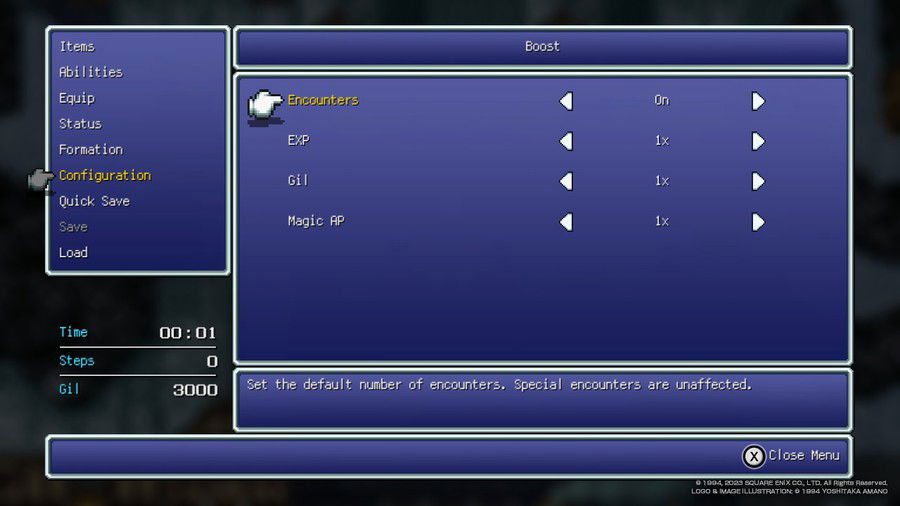
In addition to the audiovisual aspect, Pixel Remaster allows you to customize the gameplay to make it more dynamic, more agile, or more challenging. The settings menu has a subsection where we can change experience multipliers, ability points and money, with an increase of up to four times and a decrease that even allows us to lock the gain of these resources during the adventure.
In essence, these changes to the progression methodology allow the public to play in the way that best fits what they are looking for, and add a lot to the overall quality of each title and its replayability. If you want a more fluid experience without needing to suspend the adventure to gain some levels, simply increase your experience and ability points gain, and you won't need, at any point, to go around in circles to face random battles.
Likewise, if you are looking for more challenges in combat, reducing resource gains certainly guarantees an extra layer of difficulty, or even allows for the famous starting level challenge, where your characters don't gain experience or ability points during battles, leaving up to the player to rely on creativity and knowledge of the mechanics of each game to overcome the bosses and finish their journey.
To further increase the quality, experience and player autonomy, the Pixel Remaster versions have two features to speed up game progress. As we see in ports of other PlayStation 1 titles such as Final Fantasy VII or Final Fantasy IX, using a button to enable or disable random combat allows the player to pass through areas they have already explored and/or pass through a tricky dungeon while avoiding the interruption of a horde of monsters at every minute.
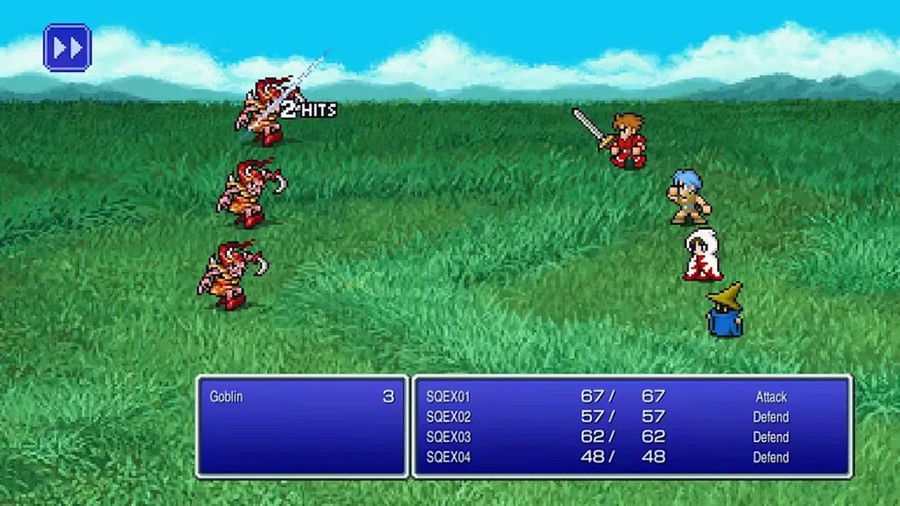
The second feature is the auto-battle option. In it, with the press of a single button, your entire team will repeat the last sequence of actions made by them and the battle will happen more quickly. Thus, it is possible to pass through random enemies without assigning direct commands every time you need to face them, which greatly speeds up progress in the games.
This junction of features where we can define how we want to experience each game and what level of challenge and time we are going to invest in it, is a demonstration of how much the Pixel Remaster version seeks to embrace several different player categories, be it the most nostalgic fans looking to remember the experience of their favorite title, for those looking for new layers of challenges, or also for those looking for more relaxing and fluid gameplay to follow the story of Final Fantasy classics.
Ad
Visual effects, art gallery and orchestral soundtrack breathe new life into Nostalgia
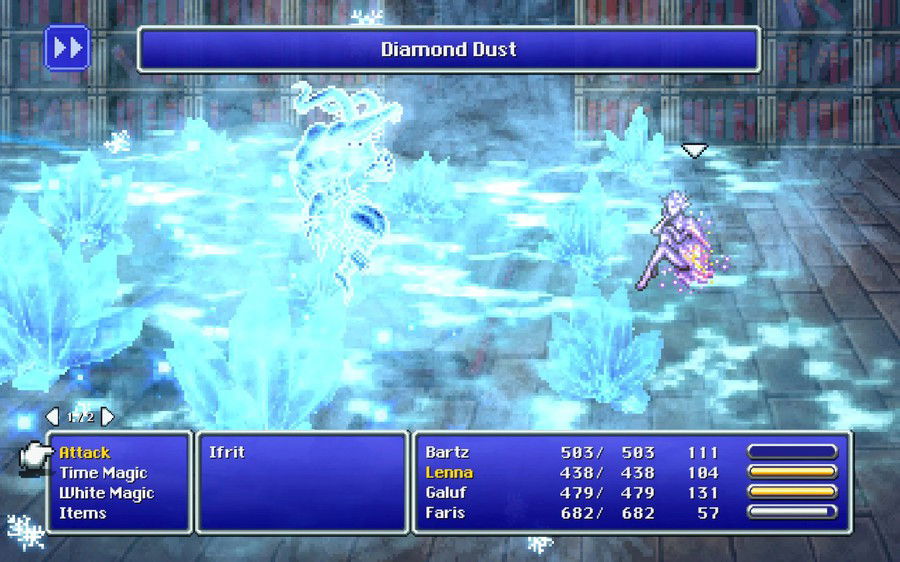
While the pixelated environment captures the essence of nostalgia, this collection maintains a freshness for older fans through its modernized visual effects for magic, Summons and some in-game events, and the option of an orchestrated soundtrack, which maintains the vivid experience even for those who have played the classics several times over the years.
In addition to the well-known Bestiary, the Pixel Remaster collection features an art gallery in each game, with conceptual and finished illustrations of several key moments, monsters and characters from each game, in addition to having a music player, with all the songs in both original and orchestrated versions.
No New Content
But not everything is perfect in this version. Previous re-releases, such as the PSP version of Final Fantasy I and II and the GameBoy Advance ports of Final Fantasy V and VI, relied on extra content beyond the original work to attract their audience beyond the mere mobility, with extra dungeons, secret bosses and even some summons and new jobs.
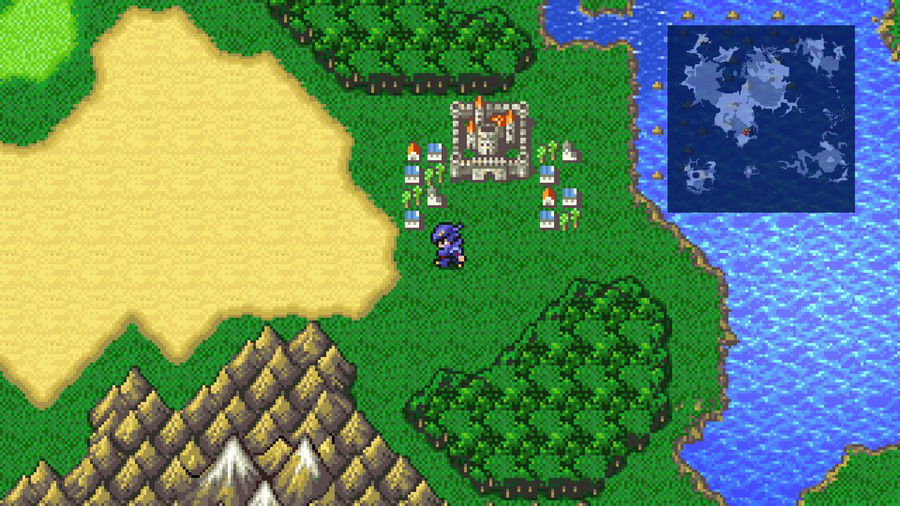
Pixel Remaster aims to remain faithful to the original games from start to finish, so while it has some improved visual and audio aspects, it doesn't have the expanded content that other ports and Remasters have received.
On the one hand, this is a little disheartening, as it means that the titles lack that hint of novelty and challenge that new secret bosses and dungeons guarantee to the public. On the other hand, this guarantees a narrative and gameplay experience almost the same as the games when they were released, without the need for expansion through dungeons and additional enemies that add little to the original game's story.
Of course, not all the inherent elements of each original title are present in this Remaster. For example, the NES/SNES versions of some games from this era are known for their bugs and sudden difficulty spikes and/or some poor level design choices - all of these, for the most part, have been fixed and/or reworked to ensure an optimized experience.
Font and font size haven't been adapted for wider screens
While it helps a lot with accessibility by adding available languages, Pixel Remaster fails in another aspect of this topic: being clearly designed for smartphone screens, the font used for dialogues and menus was also planned to fit into small scopes of perception.
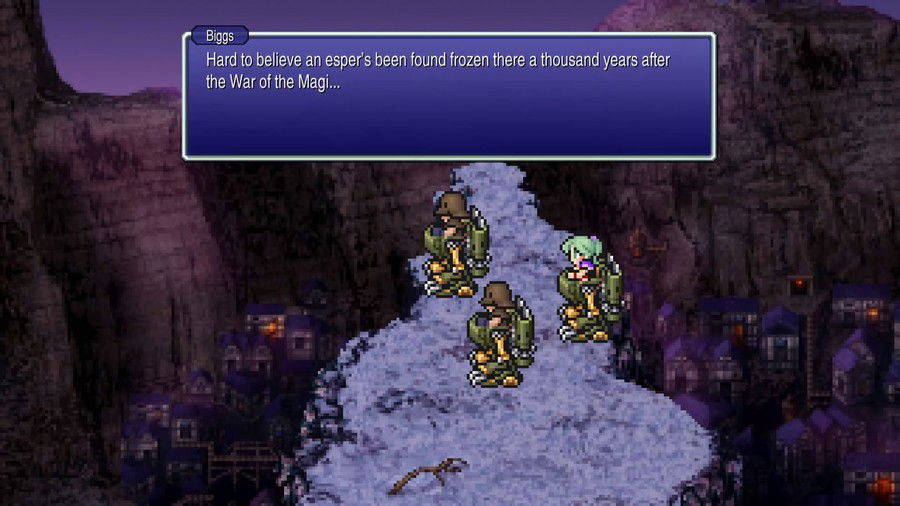
Therefore, when played on a TV screen or large monitor, the font size appears smaller and the "blank" space in dialog boxes becomes an issue. I also tested one of the games on my notebook, with a 14-inch screen, and I didn't notice the same inconvenience - that is, this is an inherent problem when playing on larger screens, and could be mitigated with an option to adjust the font size in dialogues for those who have vision problems and/or use large screens to play and don't want to be too close to them to read the dialogues.
Ad
Steep Individual Price for a Remaster
The big elephant in the room for Pixel Remaster is the individual price of its games, quite steep for a re-release. Added together, they are as expensive as deluxe versions of recently released triple-A games, convincing the consumer to buy the complete package, where they are similar to the value of a triple-A game in its normal version.
While this value may put off some players, the gameplay time of the six games combined, even if you only go through the main story, resembles or surpasses some of the main titles in the industry today, and guarantees that you will enjoy them well if you are a fan of RPG genre, especially turn-based ones, which received more recognition from current generations after Baldur's Gate 3's massive success.
The individual games seem too expensive for what they offer, so I don't recommend purchasing them unless you are a fan of a specific Final Fantasy among the six available in the package.
Comparison with Other Versions
As already explained, there are some visual and gameplay differences when comparing Pixel Remaster with other previously released versions of these titles. So how well does it fare when compared to its predecessors?
Other releases, such as the PSP versions or even the 3D remakes of Final Fantasy III and IV feature more modernized visuals that please players who prioritize graphics, and these also have optional dungeons and bosses for an extra layer of challenge, these two being the crucial elements to motivate the purchase of their respective versions.
This version focuses on nostalgia rather than graphical improvements and new content, and its main attraction lies in the general quality of the product and how it guarantees a great and flexible experience for the player, with high customization of difficulty, game time and replayability.
It seems incorrect to say that one version is better than the other, as it depends on what each player prioritizes, how they prefer to enjoy their product and the way they opt for the replayability factor.
Pros and Cons
Pros
Cons
Ad
Is Final Fantasy Pixel Remaster worth it?
SCORE: 8.5
Given its availability in multiple media and the way it approaches the player's experience and adds it to the overall quality of the product, Final Fantasy Pixel Remaster seems like the ideal version for those who want to know the origins of the franchise and for long-time fans - it guarantees the closest immersion to the experience of the original games while maintaining its own attraction by adapting well to the standards of quality of life and routine necessary for modern times, guaranteeing a unique experience according to the player's preferences.

On the other hand, its price range is high for a remaster of its size if someone chooses to buy individual titles instead of the complete package with six games, especially for consoles or Steam. The discount offered puts it at the same value as a triple-A release, being a little steep if we consider it as a Remastered bundle, but whose added value is very high due to the gameplay time and replayability that each title guarantees.
All things considered, Final Fantasy Pixel Remaster establishes itself as the definitive way to discover or rediscover the franchise's classic games, being an ideal choice for fans of the series, or for turn-based RPG enthusiasts.
Conclusion
For my holiday experience, Final Fantasy Pixel Remaster has been an incredible journey, where not only am I remembering several moments from the first times I played these games at the time of their re-releases for the PlayStation 1, but I also have the opportunity to analyze them with more mature and more critical eyes, understanding how each of them may have stood out in their time and the natural evolution of the series during its 37 years.
Therefore, I will start my reviews season from Final Fantasy I to Final Fantasy VI in the coming months, based on the experience that this new version provides with its fidelity to the original releases.
Thanks for reading!
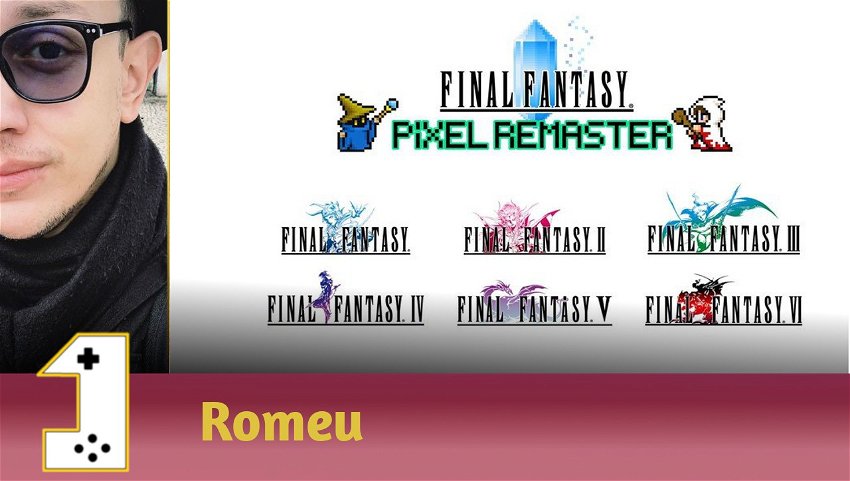


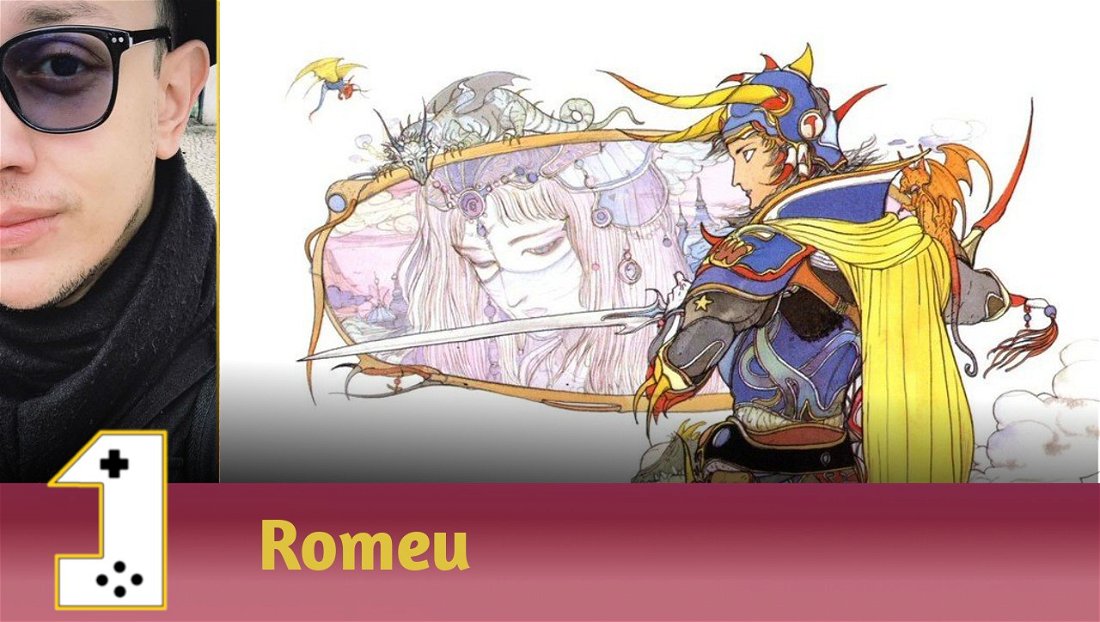



— Comments0
Be the first to comment